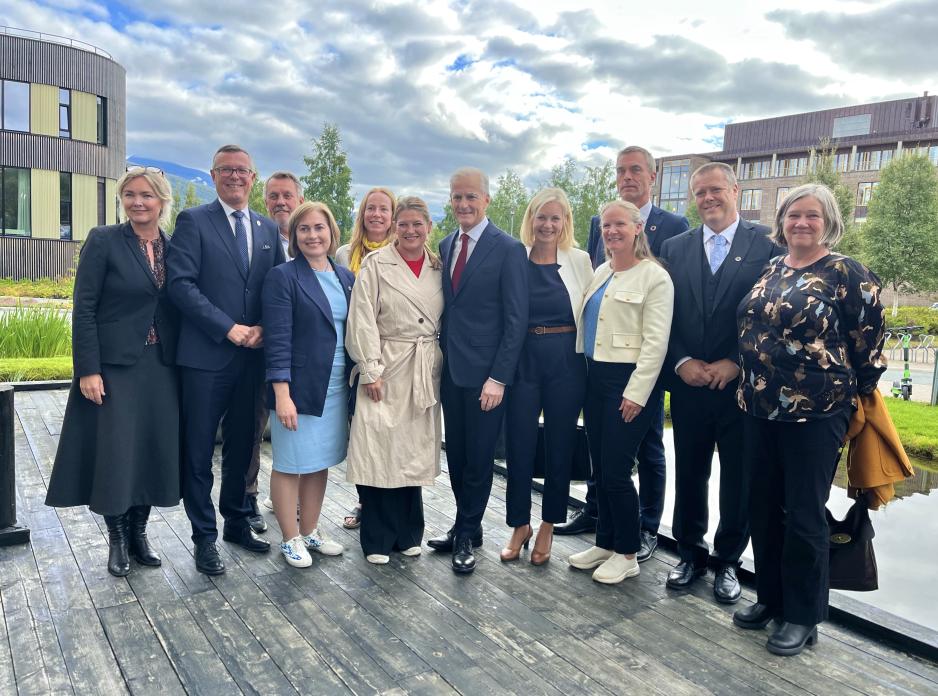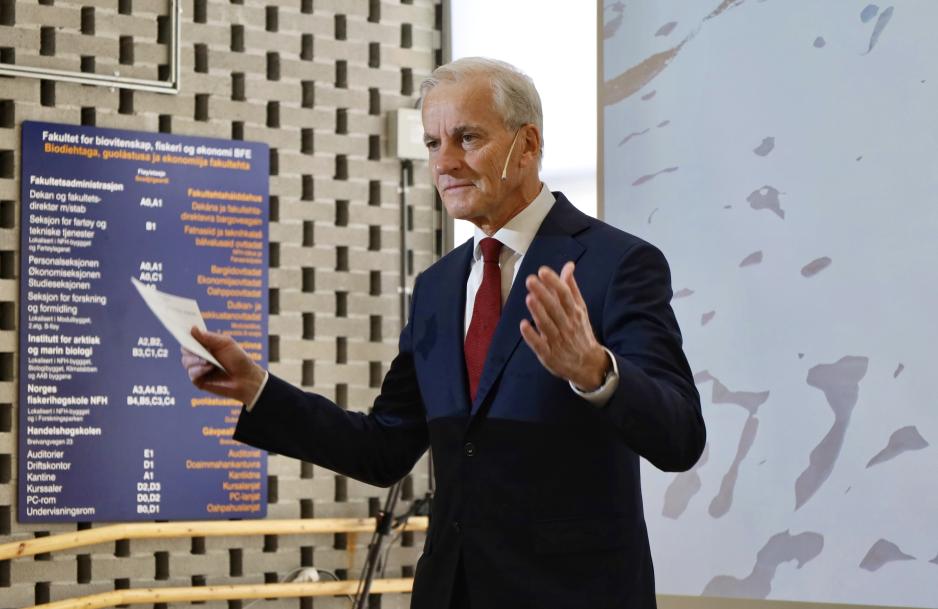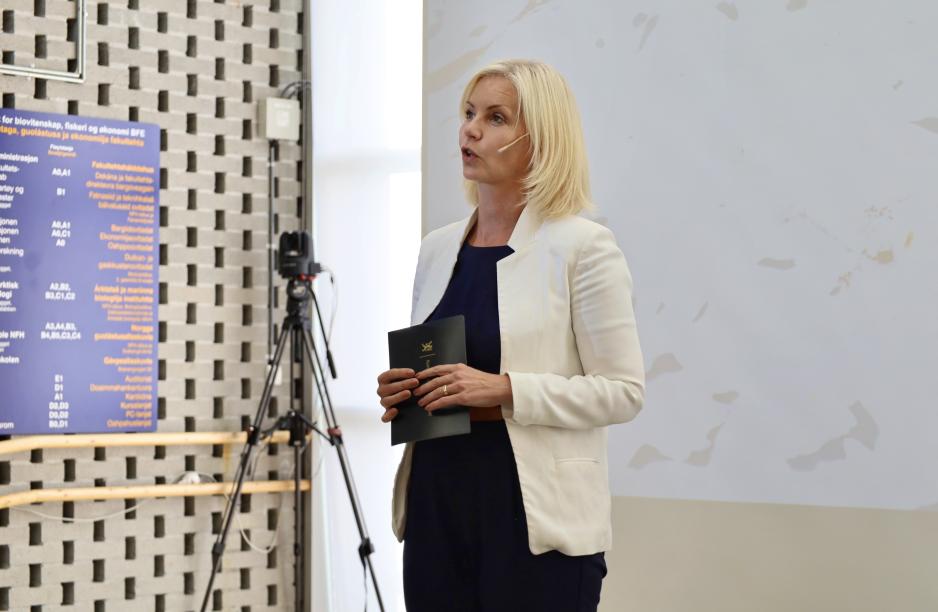Norway's High North Strategy: NOK 1 Billion For Polar Research

Norway’s Prime Minister Jonas Gahr Støre (standing in the middle), flanked by Minister of Research and Higher Education Sigrun Aasland (right) and Minister of Trade and Industry Cecilie Myrseth (left), visited UiT the Arctic University of Norway in Tromsø on Tuesday to launch a major, long-term initiative in polar research. (Photo: Astri Edvardsen)
Tromsø, Northern Norway (High North News): Norway's biggest research project, Arctic Ocean 2050, will be fully funded over the course of ten years, promised Norwegian PM Jonas Gahr Støre on Tuesday. "A fantastic boost for Norwegian and international polar research," responds the Rector at UiT the Arctic University of Norway.
"We commit to increasing our efforts in polar research with NOK 1 billion in the next ten years, starting in 2026. With Arctic Ocean 2050, we will strengthen our position as a leading polar research nation," said Norwegian Prime Minister Jonas Gahr Støre (Labor) in Tromsø, Northern Norway, on Tuesday.
In a few decades, the Arctic Ocean will be seasonally ice-free, and the consequences of this will be explored in the major, Norwegian research project Arctic Ocean 2050.
The project gathers Norway's most prominent polar researchers from across the country, and covers geopolitics, defense and security policy, business, international law, environment, climate, and energy.
It's this project, scheduled to take place from 2026 to 2036, which has now received promises from the Norwegian government about its place in the state budget in the coming years.
"We had great expectations for the government to deliver something on Arctic Ocean 2050 today, but the actual full financing of NOK 1 billion over ten years, just like we asked, is a fantastic boost for Norwegian and international polar research. This will brand Norway as an Arctic research nation for decades to come," says Dag Rune Olsen, Rector at UiT the Arctic University of Norway.

The Norwegian government puts a high value on polar research, said PM Jonas Gahr Støre. "When we presented the national security strategy on May 8th, we included the significance of Norway's management and development of an idea advantage regarding knowledge in the North," he pointed out. (Photo: Astri Edvardsen)
From the podium, the prime minister emphasized the need for more knowledge about the dramatic changes in the North and that Norway must spearhead this knowledge development.
"When the ice melts and the Arctic Ocean changes color from white to blue, a big box opens. We know a little, but the most important thing is what we don't know and need to know," said Støre and continued:
"There will be more shipping and new trade routes. There will be new opportunities within fisheries, tourism, and other businesses. There will be conflicts and rivalry over resources. We see an increasing geopolitical interest in the Arctic in the current security policy landscape. Therefore, we must strive to get ahead in terms of knowledge."
"Part of the changes that are happening are things we cannot stop, but we must understand them and build knowledge in order to control the development where we can. Therefore, we are making this investment in polar research. We will face new times with insight, presence, and longevity."

Norway will be clearly present in the North and take responsibility for gathering new knoeldge about climate change and other changing processes in the Arctic, emphasized the Norwegian Minister of Research and Higher Education, Sigrun Aasland. (Photo: Astri Edvardsen)
"Crucial to Norway's security"
The Norwegian Minister of Research and Higher Education, Sigrun Aasland, was also present in Tromsø.
"With Arctic Ocean 2050, Norway shows responsibility as an Arctic knowledge nation. We will be close to the developments, we will understand the rapid changes that take place, and we will connect knowledge from many areas of society in this project. This is crucial to Norway's security," said Aasland.
She points out that the project will conduct extensive Arctic Ocean studies.
"The project will study ocean areas that have not been available before and explore conditions on the seabed, in the deep sea, and in the upper atmosphere. The Arctic Ocean will be studied from all angles with data from sensors on underwater installations, boats, autonomous vehicles, drones, aircraft, and satellites. Thereby, we will better understand what is happening and not least what we can do about it."
The minister also adds that Arctic Ocean 2050 is of great international interest.
"With this project, we are not only establishing our position as an Arctic research nation, but it also making us a very relevant cooperation partner for our allies. Both British and German research environments have said that they want to cooperate with us and contribute with their own funding," said Aasland.
More about Arctic Ocean 2050
· Arctic Ocean 2050 is a major, ten-year research program (2026–2036) that unites 18 Norwegian research institutions in an effort to adress how the Arctic Ocean will change in the near future. It is based on a 2024 merger of the polar projects The Nansen Legacy and GoNorth.
· The aim is to develop inter- and transdisciplinary insights urgently needed to facilitate the development of updated management principles for the new Arctic Ocean.
· Participating institutions: UiT the Arctic University of Norway (chair), the Fridtjof Nansen Institute, the University of Bergen, the Norwegian University of Science and Technology, the University of Oslo, the Norwegian Polar Institute, the Institute of Marine Research, the Norwegian Meteorological Institute, the Nansen Center, Akvaplan-niva, Norwegian Defense Research Establishment, the Geological Survey of Norway, NORCE, the Norwegian Institute of International Affairs, the University Center in Svalbard, SINTEF, the Norwegian Institute for Nature Research and NORSAR.



